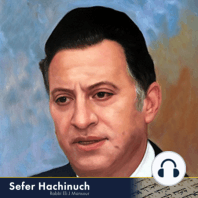20 min listen
Misva #76: Convicting an Offender Based on a Simple Majority
FromSefer Hachinuch
ratings:
Length:
20 minutes
Released:
Nov 18, 2021
Format:
Podcast episode
Description
The Torah commands in Parashat Mishpatim (Shemot 23:2), “Lo Tiheyeh Ahareh Rabim Le’ra’ot” – literally, “Do not follow the majority for evil matters.” The Sages understood this verse as commanding a court not to convict a defendant charged with a capital offense based on a simple majority. When it comes other cases, the majority opinion among the judges of the Bet Din is accepted even if the majority exceeds the minority by just a single vote. When it comes to capital cases, however, which are tried by a tribunal of twenty-three judges, the defendant is convicted and put to death only if at least thirteen judges vote to convict. If a court executes a defendant who was found guilty by a vote of 12-11, then the court is in violation of this Biblical command, and are deserving of severe punishment for killing somebody who did not deserve execution. The Sefer Ha’hinuch explains that since the death penalty cannot be reversed, extra caution must be taken to avoid a mistaken conviction in capital cases. Therefore, we are bidden to follow G-d’s quality of “Rab Hesed,” extending beyond the strict letter of the law and judging favorably, for the sake of preventing even the remote possibility of an erroneous guilty verdict. Therefore, as an extra precaution, the Torah required a majority of at least two judges to convict someone accused of a capital offense. The Gemara in Masechet Sanhedrin (17) establishes the counterintuitive Halacha that if all twenty-three judges unanimously decide upon a guilty verdict, then the defendant is acquitted. Different reasons are given for this surprising Halacha. One approach taken is based on a different Halacha requiring the judges of a Bet Din to wait overnight before finalizing their decision to convict. In order to ensure a correct ruling, the judges are not to finalize their decision the same day it is reached, but rather delay the final ruling to the next day. The reason is that over the course of the night, they might perhaps revisit the case in their minds and view it from a fresh perspective, such that they will see some merit in the argument to acquit. But if no judge voiced the opinion to acquit, then the judges cannot observe this Halacha. Since no argument was made in defense of the suspect, the judges cannot rethink and consider the argument to acquit, as it was never expressed in the first place. For this technical reason, some have argued, the defendant is acquitted if no judges vote to acquit him. The Maharitz Hiyut (Rav Tzvi Hersh Chajes, 1805-1855) offers a different explanation. He notes that every offender always has some line of defense; whenever somebody is suspected of committing a crime, there will be some argument, however weak, that can be made on his behalf. And thus if the Bet Din unanimously decided to convict, then necessarily they did not thoroughly examine all sides of the case. Therefore, the defendant is acquitted. Others claim that if a person committed a capital offense so openly and brazenly, such that there is no possible argument that can be brought in his defense, then the death penalty is not a severe enough punishment. Bet Din therefore does not punish the violator, and the punishment is left to G-d, who will ensure that the violator receives what he or she deserves. The Or Ha’hayim (Rav Haim Ben-Attar, 1696-1743) observes that these laws – that an offender is not put to death based on a simple majority, or if the court convicts unanimously – could potentially be manipulated by a judge. If a judge feels that the defendant is innocent, and he sees that all his twenty-two colleagues feel that the defendant is guilty, he might decide to dishonestly vote to convict, such that the court will unanimously convict and the defendant will thus be acquitted. If he votes to acquit, then there will be a decisive majority for a conviction, and the defendant will be put to death, and so the judge might choose to join his colleagues in voting for a conviction. The Or Ha’hayim
Released:
Nov 18, 2021
Format:
Podcast episode
Titles in the series (100)
Misva #19: The Prohibition Against Eating Hametz on Pesach: Daily Sefer Hachinuch - Brought to you by itorah.com by Sefer Hachinuch
